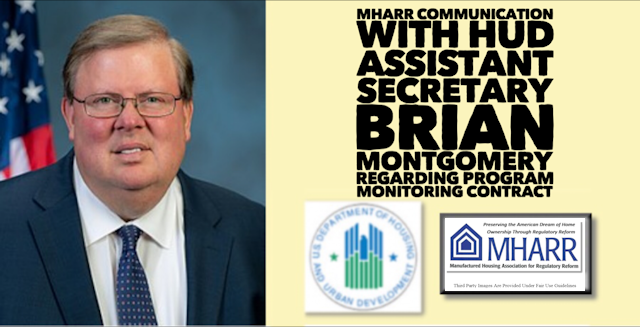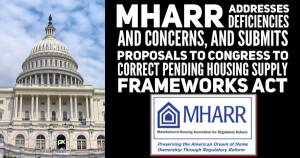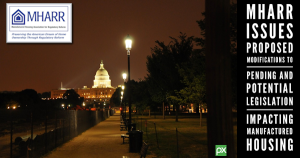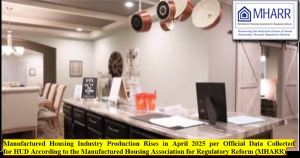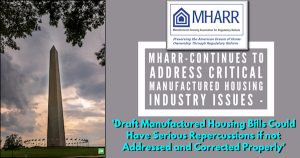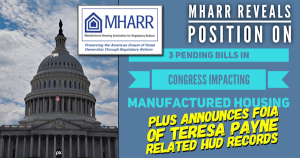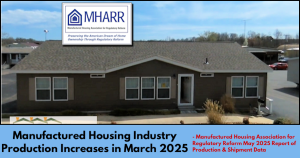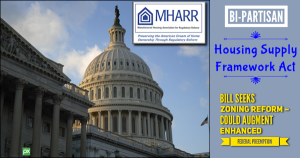[vc_row][vc_column][vc_column_text]October 26, 2018
VIA FEDERAL EXPRESS
Hon. Brian Montgomery
Assistant Secretary
U.S. Department of Housing and Urban Development
Suite 9100
451 7thStreet, S.W.
Washington, D.C. 20410
Re: Manufactured Housing Program Monitoring Contract
Dear Secretary Montgomery:
As the national representative organization for small businesses within the comprehensively-regulated manufactured housing industry, the Manufactured Housing Association for Regulatory Reform (MHARR) continuously monitors regulatory and regulation-related matters that could negatively impact the purchase affordability of manufactured homes – the nation’s premiere source of inherently affordable, non-subsidized homeownership.
Given this core mission, MHARR has been gratified by the actions undertaken by President Trump since his inauguration – and by Secretary Carson – to reduce unnecessary regulatory burdens at HUD, including those imposed on the nation’s manufactured housing producers. That said, however, MHARR has begun to observe, in recent months, what appears to be backsliding within the manufactured housing program, away from the full implementation of the regulatory reform policies exemplified by Executive Orders 13771 and 13777, and toward a return to the type of baseless, unwarranted and excessively costly regulatory excesses and abuses that characterized the program under previous administrations. In particular, there is an extremely serious and damaging aspect of that activity that warrants your personal involvement and intervention.
Specifically, as you are aware from your previous tenure at HUD, contracting processes within the federal manufactured housing program – and particularly the contracting process for the program “monitoring” contract, a statutorily defined and circumscribed function – have been dysfunctional at best and unlawful at worst. For the entire40-year-plus history of the federal program, the enforcement “monitoring” contract has been awarded to onecontractor, albeit under different organizational names. Although allegedly a “competitive” procurement, the facts show this is to be false. Instead, based on HUD contract “award criteria” that, through successive procurements, have been tailored to match the “experience” of the one and only incumbent contractor – i.e., the Institute for Building Technology and Safety (IBTS) but previously named the National Conference of States on Building Codes and Standards (NCSBCS) and “Housing and Building Technology” (HBT) – this procurement, through its entire history, has been a defactosole-source procurement without competing bidders, without any type of meaningful, actual or legitimate competition, and without anyof the safeguards required by law and applicable regulations for sole-source contracting.
Indeed, on the one occasion when a competing bid, lower than that of IBTS, wassubmitted, nearly three decades ago, by a highly-respected and credible code organization (i.e., the former Council of American Building Officials – “CABO,” now, the International Code Council – “ICC”), HUD, rather than awarding the contract to another entity, initiated a “best and final” bidding round, which ultimately led to an award – once again – to IBTS (as shown by documents provided Congress after multiple requests).
This contract manipulation and the resulting domination of the program over the course of its existence by oneentrenched, self-servingcontractor — which has effectively been delegated discretionary government authority in violation of federal law — has had a ruinous effect on the HUD manufactured housing program, the industry itself and consumers in particular, as the purchase price of manufactured homes has needlessly been inflated by the unnecessary, unjustified and baseless expansion of regulatory compliance burdens at the initiative and behest of the entrenched monitoring contractor. Indeed, detailed MHARR analyses have demonstrated how HUD payments to the monitoring contractor have ballooned over the past decade in particular (to more than $25 million in the last five-year contract), even as industry production levels have fallen to historic low levels and referrals to the HUD dispute resolution system (reflecting unresolved consumer issues in new HUD Code homes) have been – and remain – at microscopic levels, well below 1% of corresponding industry production over the same period. The needless regulatory costs and burdens imposed by the contractor, moreover, disproportionatelyimpact and harm smaller industry businesses (and consumers of affordable housing) while benefitting the industry’s largest producers, which can spread spurious pseudo-regulatory costs over a larger base of production. It should thus be no surprise that you will hear nothing about this issue from other industry organizations, which are beholden to the support of those larger entities.
Although Congress, in the Manufactured Housing Improvement Act of 2000 attempted to halt this manipulation of the HUD contracting process and the resultant domination of the federal program by the entrenched contractor through, among other things, its mandate for an appointed, non-career program administrator, its requirement for “separate and independent” contractors for monitoring and other functions, its narrow and limited definition of the “monitoring” function, and its requirement – in section 604(b)(6) – for notice and comment rulemaking and Manufactured Housing Consensus Committee review and approval for all changes to HUD policies, practices and procedures concerning enforcement-related activities, HUD has either totally ignored, unduly restricted, or chipped away at these safeguards, effectively neutering Congress’ effort to restore standards and accountability to the monitoring contract process. HUD has thus not only failed to protect the industry’s smaller businesses (and consumers of affordable housing) from regulatory excesses and abuses, but has actually undermined one of the primarypurposes of the 2000 reform law.
And, while there were indications, in 2017, that HUD, under Secretary Carson, would reform this process and conduct a legitimate procurement for the monitoring function (including a meeting for prospective bidders in November 2017 and the division of the monitoring contract into design and production monitoring functions), it now appears that HUD has backtracked from any such reforms, and that is our reason for writing to you.
Specifically, MHARR has learned that the last IBTS monitoring contract, which was due to expire in August 2018 (and which was the subject of the November 2017 bidders meeting), instead of being replaced with a new, genuinely competitive contract, has instead been extended for (at least) one year through a no-bid, sole-source, so-called “bridge” contract.
As objectionable and damaging as this is in itself, for continuing – on a dejurebasis – HUD’s addiction to sole-source procurements for this function, the official HUD “Justification for Other than Full and Open Competition” (Justification Document) document for this contract, lauds the entrenched incumbent contractor in ways that indicate that that there will no “full and open” competition for the full-term monitoring contract that succeeds the alleged “bridge” contract. For example, the Justification Document states, among other things: “the depth and breadth of knowledge demonstrated by the contractor [i.e., IBTS] during the performance of the current contract makes them uniquely qualified to perform services during the 12-month bridge. *** The contractor’s experience is unique because the contractor has extensive knowledge of working with HUD’s national building code 924 C.F.R. 3280) in areas of code administration and enforcement for several decades.”
Such language – coupled with the no-bid, sole-source “bridge” contract itself – indicate that HUD has no intention of conducting a legitimate, competitive solicitation for the next monitoring contract that will “drain the swamp” of 40-plus years of abuse. Indeed, such accolades for the entrenched incumbent could become a self-fulfilling prophecy, discouraging other bidders from competing for the contract, thereby continuing and reinforcing HUD’s multiple violations of applicable law (i.e., MHARR has searched for, but has unable to locate, anysimilar instance of such a 40-year-plus dependence on one entrenched defactosole-source contractor) and undermining Secretary Carson’s effort to reform the manufactured housing program. Indeed, legitimate competition, a new monitoring contractor and a monitoring contract that complies with substantive law regarding the limited nature of the monitoring function, are essentialto the successful implementation of any such reforms.
This no-bid, sole-source “bridge” contract and related activity, accordingly, is totally unacceptable to the industry’s smaller businesses. We will therefore contact your office soon to schedule a meeting to address this extremely serious matter.
Sincerely,
Mark Weiss
President and CEO
cc: Hon. Mike Pence
Hon. Ben Carson
Hon. Mick Mulvaney
Hon. Michael Crapo
Hon. Sherrod Brown
Hon. Jeb Hensarling
Hon. Maxine Waters
HUD Code Industry Manufacturers[/vc_column_text][/vc_column][/vc_row]

